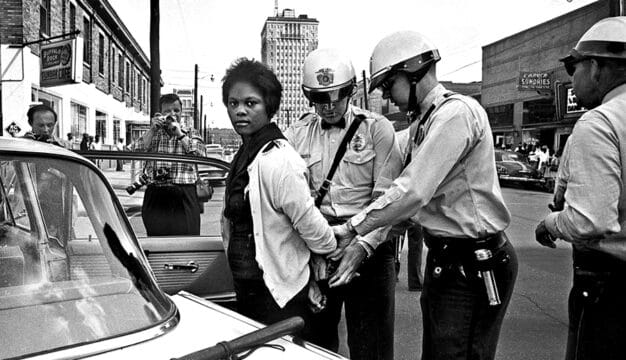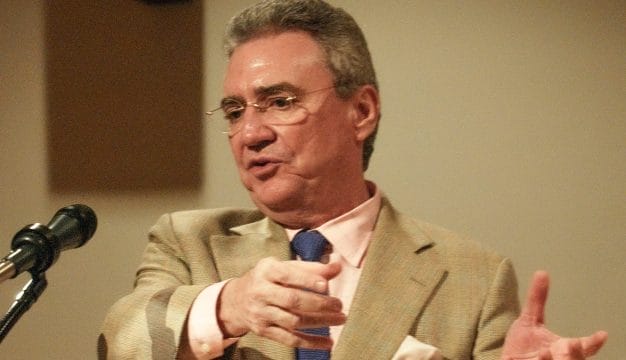Howard Hill
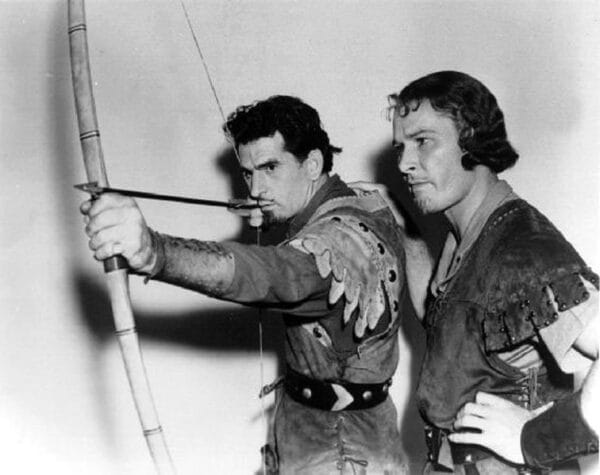 Howard Hill and Errol Flynn
Often referred to as the “World’s Greatest Archer,” Howard Hill (1899-1975) was an internationally famous archer best known for his trick shots and prowess as a hunter. He served as a stuntman, producer, and director for many short and feature films from the 1930s to the 1950s, the most famous of which was The Adventures of Robin Hood (1938) starring Errol Flynn.
Howard Hill and Errol Flynn
Often referred to as the “World’s Greatest Archer,” Howard Hill (1899-1975) was an internationally famous archer best known for his trick shots and prowess as a hunter. He served as a stuntman, producer, and director for many short and feature films from the 1930s to the 1950s, the most famous of which was The Adventures of Robin Hood (1938) starring Errol Flynn.
Howard Hill was born on November 13, 1899, in Wilsonville, Shelby County. The son of farmers John F. and Mary E. Hill, he and his sister grew up in rural Shelby County, where he encountered wild animals from an early age. Hill’s father crafted a bow and set of arrows for his son out of white oak and river cane, and he started shooting when he was four years old. As he grew up, he excelled in all athletics and in high school earned varsity letters in baseball, basketball, and football.
Hill continued his athletic pursuits as a college student, playing baseball, basketball, and football at Auburn Polytechnic Institute (API; present-day Auburn University). He paid his way through college by giving archery lessons during summer vacations. His skill with a bow and arrow inspired his classmates to give him the nickname ‘Cupid.’ In 1922, Hill married Elizabeth Hodges, a school teacher from Ashville, St. Clair County; they had no children. Hodges also practiced archery and accompanied her husband on some of his hunting trips; she had the reputation of being an excellent archer herself and served as an extra in Hill’s filmwork.
Hill graduated from API in 1923 and began to focus entirely on archery. He excelled at all three branches of the sport—flight, target, and field—and according to some sources is the only person to win 196 archery field tournaments in succession, a streak that ended in 1928. The same year, he set a world record for the furthest flight shot by shooting an arrow 391 yards. Target archery is the most popular form of modern competitive archery and involves archers shooting at stationary round targets set at varying distances. In field archery, the archer shoots at targets set at varying distances on uneven terrain, usually in a forested setting. Flight archery is the only form of archery that does not involve a target. Its purpose is to shoot an arrow as far as possible and requires a special bow and arrows that maximize power and minimize drag. He also wrote the first set of archery golf rules in 1928.
A natural performer, Hill participated in numerous archery exhibitions, shows, and tournaments. He also acted and performed stunts for a number of Warner Brothers’ films. In 1937, he appeared in the film The Singing Buckaroo as the Native American friend of the male lead, played by Fred Scott. The following year, he served as an archery expert on the short film Follow the Arrow, which included a skeet-shooting contest between Hill and a shotgun expert. Hill performed all the bow-and-arrow stunts for The Adventures of Robin Hood (1938), in which he split nine arrows, and the stunts for The Private Lives of Elizabeth and Essex and Dodge City in 1939 and Virginia City (1940), which also starred Flynn.
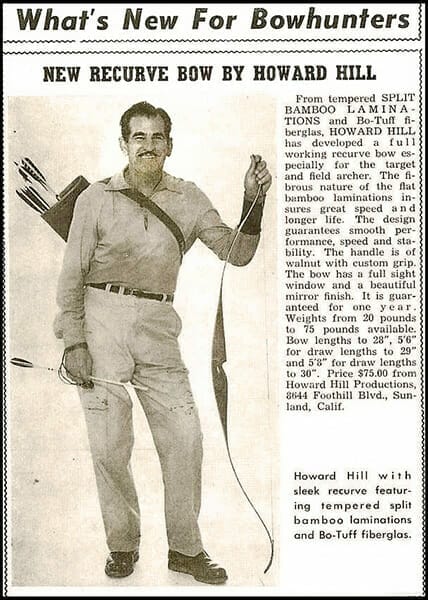 Howard Hill Ad
In 1941, Hill performed for 35,000 spectators at Grant Park in Chicago. After the shooting exhibition, the crowd allegedly tore the shirt off his back and took his bow and arrows for souvenirs. The same year, he directed the short instructional film, Points on Arrow, and performed the stunts for the film They Died With Their Boots On, which tells the story of the Battle of Little Bighorn and starred Errol Flynn as Gen. George Armstrong Custer. The following year, he won the International Field Meet in Milwaukee, Wisconsin. Hill would go on to direct several short films during the 1940s, including Hunting the Devil Cat, The Man Killers, and King of the Archers in 1943; Champions of the Future, Outdoor Living, and Filipino Sports Parade in 1944; and The Lazy Hunter and Cavalcade of Archery in 1946. He also performed the shooting stunts for the feature films Buffalo Bill (1944) and Bandits of Sherwood Forest (1946).
Howard Hill Ad
In 1941, Hill performed for 35,000 spectators at Grant Park in Chicago. After the shooting exhibition, the crowd allegedly tore the shirt off his back and took his bow and arrows for souvenirs. The same year, he directed the short instructional film, Points on Arrow, and performed the stunts for the film They Died With Their Boots On, which tells the story of the Battle of Little Bighorn and starred Errol Flynn as Gen. George Armstrong Custer. The following year, he won the International Field Meet in Milwaukee, Wisconsin. Hill would go on to direct several short films during the 1940s, including Hunting the Devil Cat, The Man Killers, and King of the Archers in 1943; Champions of the Future, Outdoor Living, and Filipino Sports Parade in 1944; and The Lazy Hunter and Cavalcade of Archery in 1946. He also performed the shooting stunts for the feature films Buffalo Bill (1944) and Bandits of Sherwood Forest (1946).
Hill continued his film work in the 1950s, directing the short Art of Archery (1951) and directing and starring in the full-length documentary Tembo (1952), which was filmed on location in Africa and shows Hill hunting and killing pythons, crocodiles, a lion, a leopard, and an elephant with only a bow and arrow. In 1953, he published Hunting the Hard Way, which discusses his methods and knowledge of bow hunting. He published a second book, Wild Adventure, in 1954, which relates tales of Hill’s various hunting expeditions and includes a foreword by Errol Flynn, with whom Hill had become friendly.
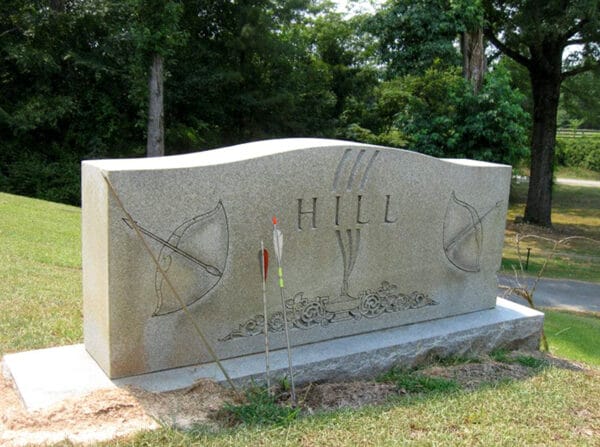 Howard Hill Grave
Hill was awarded a plaque by the Archery Council of California in 1959 for his achievements in the field. The following year, he established Howard Hill Archery, Inc., which designed and sold traditional longbows and archery equipment; based in Montana, it continues to operate under the management of the Ekin family, friends of Howard and his wife Elizabeth. In 1962, Hill was elected an honorary life member of the Professional Archery Association. Hill and Elizabeth moved back to Alabama in 1965, where they lived on the income from the sale of Howard Hill archery equipment. He was inducted into the Alabama Sports Hall of Fame in 1971. In 1975, Hill died in Birmingham and was buried at the New Ashville City Cemetery in Ashville. His grave marker is etched with two bows and arrows. An annual archery tournament, the Howard Hill Southeastern Classic, was established to honor Hill in 2004.
Howard Hill Grave
Hill was awarded a plaque by the Archery Council of California in 1959 for his achievements in the field. The following year, he established Howard Hill Archery, Inc., which designed and sold traditional longbows and archery equipment; based in Montana, it continues to operate under the management of the Ekin family, friends of Howard and his wife Elizabeth. In 1962, Hill was elected an honorary life member of the Professional Archery Association. Hill and Elizabeth moved back to Alabama in 1965, where they lived on the income from the sale of Howard Hill archery equipment. He was inducted into the Alabama Sports Hall of Fame in 1971. In 1975, Hill died in Birmingham and was buried at the New Ashville City Cemetery in Ashville. His grave marker is etched with two bows and arrows. An annual archery tournament, the Howard Hill Southeastern Classic, was established to honor Hill in 2004.
Additional Resources
Hill, Howard. Hunting the Hard Way. 1953. Reprint, New York: Derrydale Press, 2000.
———. Wild Adventure. 1954. Reprint, New York: Derrydale Press, 2000.
